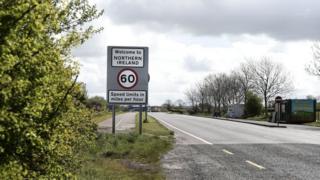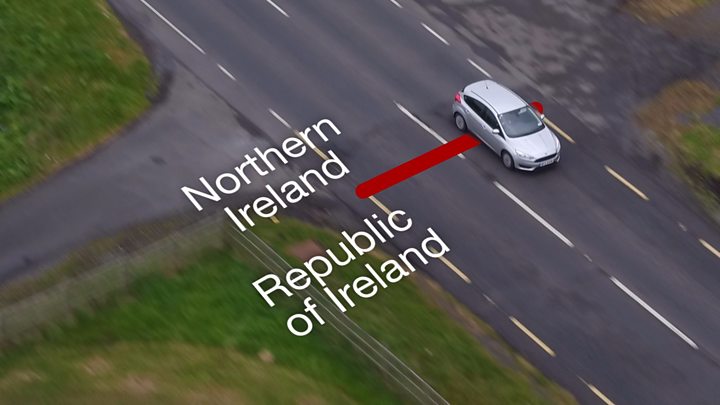 Image copyright
Getty Images
Image copyright
Getty Images
Ireland's deputy prime minister has hit out at claims that the UK government was proposing "customs clearance zones" on both sides of the Irish border.
On Monday night, Irish national broadcaster RTÉ said the UK plan would replace the backstop.
However, on Tuesday, Prime Minister Boris Johnson denied tabling such a proposal.
Proposals for reaching a Brexit deal had been expected ahead of a crucial EU summit on 17 October.
The BBC understands that any further customs inspections would be very limited.
Political correspondent Iain Watson said they could be conducted either at new locations or at existing business premises.

Media playback is unsupported on your device
The UK is due to leave the EU on 31 October, and Prime Minister Boris Johnson has said this will happen whether or not there is a new deal with Brussels.
On Monday night, RTÉ said it had seen extracts of proposals sent from London to the European Union.
The proposals would mean posts created on both sides of the border, potentially five to 10 miles back from the land frontier.
The ideas are contained in documents sub mitted during recent EU discussions.
In a tweet, Tánaiste Simon Coveney said the proposals were a "non-starter", adding Northern Ireland and the Republic of Ireland "deserve better".
BBC Europe editor Katya Adler said were the customs sites to become the official UK position, it would be dismissed and rejected by the EU as insufficient.
The Irish government said it had yet to see any credible alternatives to the backstop.
Tracking devices
Currently, there are no border posts, physical barriers or checks on people or goods crossing the border between Northern Ireland and the Republic of Ireland.
The backstop is a measure in the withdrawal agreement, between Theresa May and the EU, which is designed to ensure that continues after the UK leaves the EU.
It comes into effect only if the deal deciding the future relationship between the UK and EU is not agreed by the end of the transition period.
RTÉ said that Mr Johnson has insisted Northern Ireland remain completely outside the EU's customs union for industrial goods and agri-food products.
Under the British proposals, both the UK and EU would create what are believed to be called "customs clearance sites" but to all intents and purposes a customs post, the broadcaster reports.
It said consignments would be checked and cleared at the sites, with data being provided to the customs authorities on both sides of the border.
The authorities would decide on the basis of the data which truck or consignments to check.
It is understood there could be up to 10 such sites on either side of the border.
Also included is the proposal that goods moving from a customs clearance site on the northern side of the border to a similar site on the southern side would be monitored in real time using GPS via mobile phone data, or tracking devices placed on trucks or vans.
The ideas are contained in one of four so-called non-papers submitted by UK officials during recent technical discussions in Brussels.
'Out of the question'
The UK is due to leave the EU on 31 October, and Mr Johnson says this will happen whether or not there is a new deal with Brussels.
A spokesman for the Irish government said: "The EU Task force has indicated that any non-papers it has received from the UK to date fall well short of the agreed aims and objectives of the backstop.
"Ireland's priorities are protecting the Good Friday Agreement, avoiding a hard border and protecting the all island economy, and protecting the EU single market and its benefits for Irish businesses and consumers."
Sinn Féin leader Mary-Lou McDonald told the BBC's Today programme the plan was "essentially the re-imposition of a hard border on Ireland".
She said the proposal "goes against all of the commitments that have been entered into by the British government at the get-go of this Brexit process".
She added: "Sometimes, I wonder, if we've been having a dialogue of the deaf between our two islands; between the European system and the British system.
"Anything that causes there to be customs; tariffs, checks anywhere represents a hardening of the border."
'Disgraceful'
Mrs McDonald said Sinn Féin has explained that position in "painstaking detail" to former PM Theresa May and then to her successor Mr Johnson throughout the negotiations.
"Privately, both always told us that they understood that, and therefore it is all the more disgraceful that they would attempt to sabotage the peaceful dispensation on our island."
SDLP leader Colum Eastwood said the proposals failed to meet the UK's obligations to avoid physical infrastructure.
"It doesn't matter if it's a mile, five miles or 10 miles away, the presence of physical checks will create economic and security challenges that are unacceptable," he said.
'Smugglers' charter'
Aodhán Connolly, director of the Northern Ireland Retail Consortium, said if the proposals were true, they showed the government had not listened to business in Northern Ireland.
He also said the move "ripped up" the joint declaration of December 2017 between the EU and UK.
Seamus Leheny, from the Freight Transport Association, said the proposal contradicted "every single piece of feedback and advice that we in the NI business community have given to the government".
He said while it may work for ports, "unfortunately it is not suited to a land border".
"It's basically a smugglers' charter. If there's no enforcement at the precise border then it makes it very easy for smugglers."
